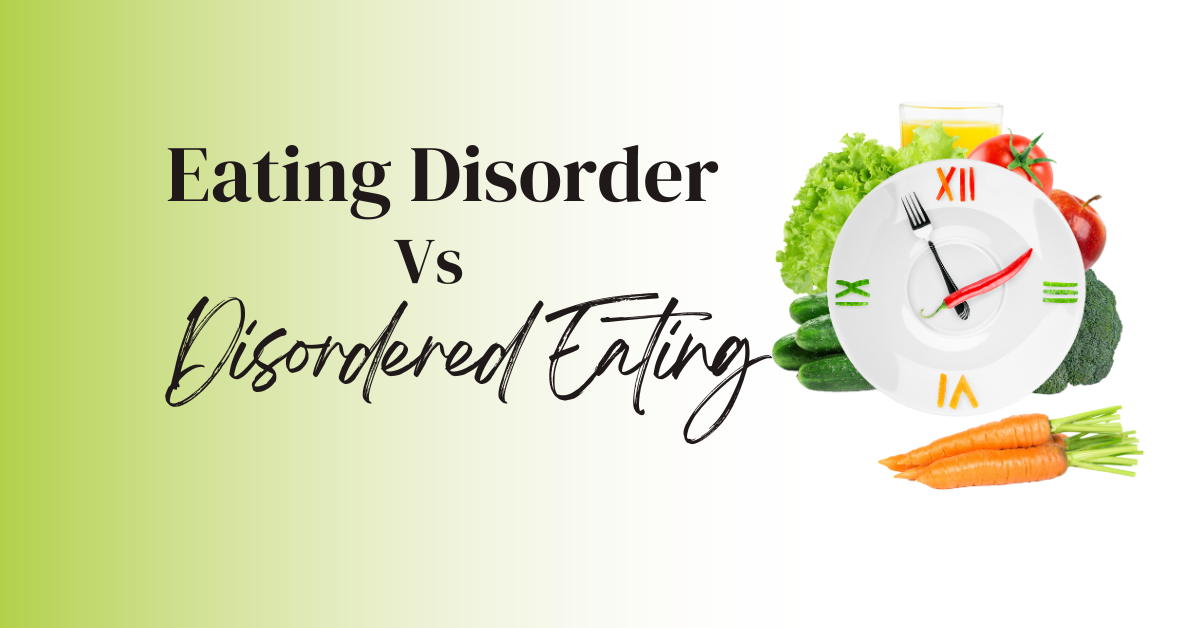In this day and age, when food fads and diets come and go quickly and people so regularly, casually discuss the manner in which they “eat their feelings” as a means of coping, it can be hard to discern when one’s eating practices morph from disordered eating into an eating disorder. The terms “eating disorder” and “disordered eating” are often used interchangeably, but they are not the same thing. While both involve unhealthy relationships with food, there are distinct differences between the two. In this article, we will explore the differences between eating disorders and disordered eating and their impact on both your mental and physical health.
Eating Disorders
Eating disorders are serious mental illnesses that affect a person’s relationship with food and overall quality of life and health. They are often characterized by extreme behaviors, thoughts, and emotions related to food and body image. Eating disorders include anorexia nervosa, bulimia nervosa, binge eating disorder, and other specified feeding or eating disorders (OSFED). Let’s review a little of each.
Anorexia Nervosa
Anorexia nervosa is an eating disorder characterized by a persistent restriction of food intake leading to significantly low body weight, a fear of gaining weight, and a distorted body image. Individuals with anorexia nervosa often have an intense preoccupation and/or fear with food, calories, and weight, and may engage in additional extreme behaviors such as self-induced vomiting, laxative abuse, or excessive exercise.

Bulimia Nervosa
Bulimia nervosa is an eating disorder characterized by recurrent episodes of binge eating followed by compensatory behaviors such as self-induced vomiting, laxative abuse, or excessive exercise. Individuals with bulimia nervosa may be of normal weight or overweight, and often have a extreme preoccupation with food, calories, and weight.
Binge Eating Disorder
Binge eating disorder is an eating disorder characterized by recurrent episodes of binge eating without compensatory behaviors (self-induced vomiting, laxative abuse, or excessive exercise). Individuals with binge eating disorder may be of normal weight or overweight, and often have feelings of guilt, shame, and embarrassment about their eating behaviors. Individuals with BED eat in a discrete period of time (e.g., within any 2-hour period), an amount of food that is definitely larger than most people would eat in a similar period of time under similar circumstances. With BED, binge episodes occur at least once per week for 3 months. So if you feel you experience a binge once a month, you do not meet the criteria for BED diagnosis.
Other Specified Feeding or Eating Disorders (OSFED)
Other specified feeding or eating disorders (OSFED) are eating disorders that do not meet the criteria for anorexia nervosa, bulimia nervosa, or binge eating disorder. Examples of OSFED include atypical anorexia nervosa, purging disorder, and night eating syndrome.

Disordered Eating (Our Expertise)...
If you don’t fall into any of the eating disorders above, more than likely you’re experiencing “disordered eating“. Disordered eating is NOT an eating disorder, rather a term used to describe unhealthy eating behaviors and attitudes towards food that deviate from what is considered normal or balanced.
Imagine going to a restaurant with a friend and ordering a salad. They look at your plate and say, “Are you really going to eat all of that? You should try the new diet everyone’s talking about.” Comments like these, along with societal pressures, can contribute to disordered eating patterns.
Dieting, “clean eating” and compulsive exercise due to our cultural obsession to achieve “thinness” can also create disordered eating behaviors which for some can lead to full-blown eating disorders.
People that struggle with disordered eating may continually follow strict diets, may develop an obsession with calorie counting, or worry about the nutritional content of everything they eat or what they weigh. This can lead to feelings of guilt and anxiety when deviating from self-imposed food rules.
Others may find themselves occasionally binge eating, consuming large quantities of food within a short period, often accompanied by feelings of shame for losing such control.
Disordered eating is not solely about the physical act of eating; it encompasses a complex psychological and emotional relationship with food. Negative body image plays a significant role, as individuals may feel dissatisfied with their appearance and believe that achieving a certain body shape or weight will bring happiness and acceptance. Many engage in disordered eating as a misguided attempt to gain control over their bodies or cope with emotional stressors.
It’s crucial to understand that disordered eating can have health consequences too and lead to higher risk of developing a clinical eating disorder.
Overall, the level of functionality is a distinguishing factor between and an eating disorder and disordered eating. When someone’s eating patterns take them away from normal functioning, this can be a strong indication of an eating disorder. This can include a woman who will not go out with friends because of the fears around their judgment while she eats. Or perhaps an individual does not attend work or school on more than one occasion due to behaviors like a compulsion to exercise because they ate too much that day. While these examples may sound extreme, those struggling often cite impairments of their social functioning as well as other obligations, due to their eating disorders.
Disordered eating still takes a toll on one’s mental well-being, causing increased anxiety, depression, and occasional social isolation, which can lead to other physical health issues and unwanted weight gain. (Check out our “What is Disordered Eating Anyway?” blog article here).
Conclusion
While eating disorders and disordered eating are not the same thing, both can have significant negative impacts on mental and physical health. If you or someone you know is struggling with a clinical eating disorder, it is important to seek help from a qualified healthcare professional. Visit www.nationaleatingdisorders.com for more information.
Most of our followers struggle with disordered eating, as we do not treat eating disorders. We thrive to help others cultivate a healthy relationship with food and body which is non-negotiable to resolve any aspect of your disordered eating. By joining any of our coaching memberships, we can help you speed up the timeline to achieving a healthy relationship with food and 10X your results. If you’re ready to start your path to diet freedom, a great starting place we recommend is our Diet Freedom Membership. Know that feeling good around food and your body is 10000% possible and you can experience this faster than you think! You got this!



